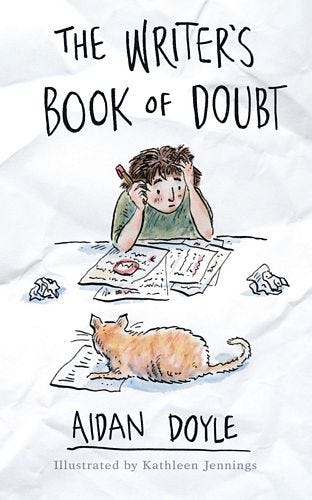This weekend, in a thematic counterpoint to last week’s Asking for Help essay, our bonus content from Aidan Doyle’s The Writer’s Book of Doubt is about saying no. Another thing I have a ton of trouble with myself…
Remember, The Writer’s Book of Doubt is out now, and for the month of July, all posts to the paid subscriber tier of this newsletter include a 50% off promo code for it! Now on to the essay.
Saying No
by Aidan Doyle
Invest in a piece of jewellery or a piece of art that is just the word NO. Wear it when you’re working—or hang it where you can see it while you sit down to answer email.
- Kelly Link
Just as it’s important to ask for help, you also need to be able to say no. Sometimes this means disappointing friends and missing out on exciting opportunities, but you can’t do everything. After you’ve worked so hard, it can feel wrong to turn down an opportunity. Sometimes overcommitting can spur you on to greater productivity, but it can also cause stress and misery. It can be thrilling the first time an editor personally invites you to contribute, but eventually there comes a point when you don’t have time for all the projects. There might be a voice telling you that you should never miss an opportunity and that if you say no, no one will invite you to do anything ever again. But you need to prioritize what’s best for your career. Sometimes this means saying no.
The more well-known you become, the more strangers will ask you to read their stories or to give them advice. How do I learn how to write short stories? Yes, it’s great to help people. Mentor people when you have the chance. But sometimes you need to say no. Your time is precious. If your book is a bestseller, you wouldn’t have time to do your own writing if you gave everyone detailed personal replies. The FAQ is your friend. Instead of answering the same question over and over again, direct people to a page on your web site.
There are also situations where you definitely want to say no. Publishers who are making a profit, but who don’t have any money to pay the writer. Exploitative contracts asking for all your rights.
Saying no can be difficult when you’re offered something you’ve been working for years to achieve, but it isn’t quite right. You’ve dreamed of having an agent and get an offer from an agent who might not be quite right for you. A bad agent is worse than no agent and can derail your career. Even a good agent might not be the right fit for you. Sometimes you might get multiple offers from agents and you’re going to have to say no to some of them. This is never an easy decision, but you should be guided by who you think will be best for your career (of course this is difficult to tell when you’ve only briefly spoke to someone). Reach out to the agents’ other clients and ask how their relationship works.
You might get an offer from a publisher and the deal isn’t what you wanted (assuming you have reasonable expectations!). Hopefully you have an agent who is acting in your best interests and can give you honest advice about what to do.
Being able to say no to yourself is also important. Sometimes you should allow yourself not to do something. Sometimes you need to be able to take a break.

The Writer's Book of Doubt came out July 10 and you can order it here. About the book:
Impostor syndrome. Thinking that your writing sucks. Feeling targeted by the rejection cannon. Despairing that no one is ever going to read your stories. Lost in Submissionland. Overwhelmed by radioactive brain weasels.
The Writer's Book of Doubt contains practical advice and inspiration for dealing with the problems of the writing life.
Illustrated by Kathleen Jennings.
With essays from:
Aliette de Bodard, Delilah S. Dawson, Kate Dylan, Malon Edwards, Meg Elison, Kate Elliott, Lauren Herschel, S.L. Huang, Crystal Huff, Kameron Hurley, Matthew Kressel, R.F. Kuang, Fonda Lee, R. Lemberg, Likhain, Jeannette Ng, A. Merc Rustad, Mary Swangin, Bogi Takács, E. Catherine Tobler, Martha Wells and Isabel Yap.


